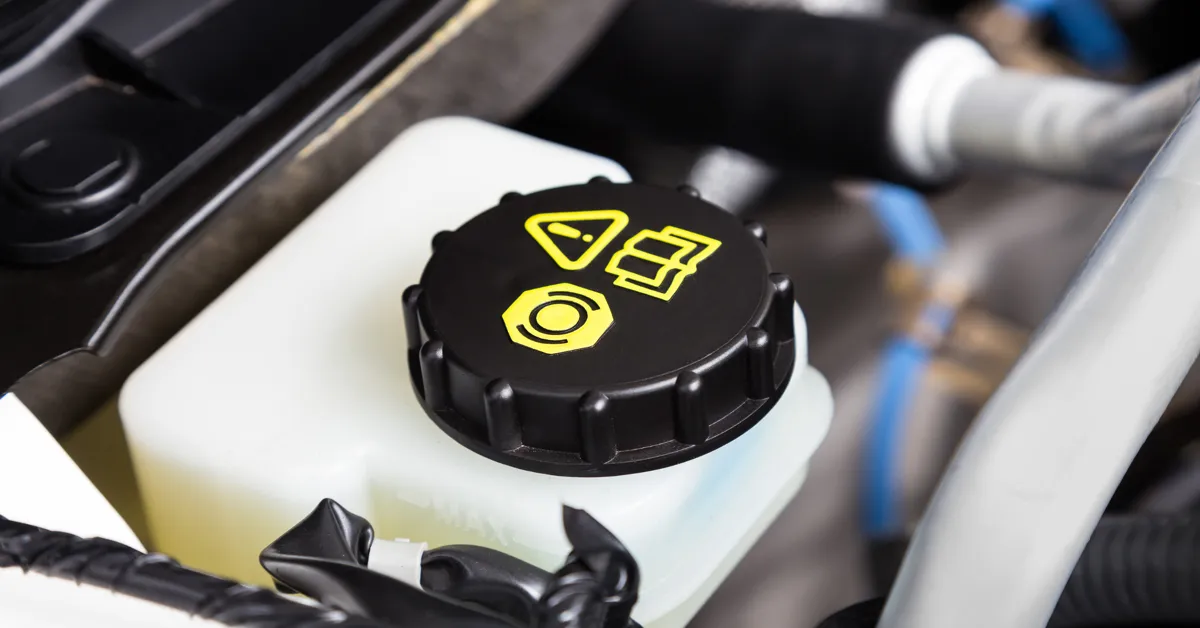You’re driving down the highway on a beautiful sunny day, enjoying the scenery and feeling the wind in your hair. Suddenly, you notice that your car’s brakes are not responding as well as they should. You quickly pull over and check the brake fluid, only to find that it has turned black.
This is a common issue that many car owners face, but do you know why it happens? In this blog, we will delve into the science behind why brake fluid turns black, and why it’s important to regularly maintain it for the safety of your vehicle. So fasten your seatbelts and Unlock the Mystery of Brake Fluid Turns Black.
Key Takeway
- Brake fluid is a crucial component of a vehicle’s braking system, responsible for transferring force from the brake pedal to the brakes.
- Fresh brake fluid is usually clear or slightly yellow in color, but as it ages, it can turn dark and murky.
- Brake fluid turns black due to moisture absorption, overheating, or contaminants and debris from normal wear and tear.
- The color change is an important indicator of the fluid’s condition and can affect the performance of your brakes.
- To prevent black brake fluid, it is essential to regularly check and change it as recommended by your vehicle’s manufacturer and have your brakes inspected by a professional.
- Ignoring black brake fluid can lead to potential safety hazards and damage to your car’s braking system.
Understanding Brake Fluid
Introduction: When we think about our car’s braking system, we often focus on the brake pads, rotors, and calipers. However, there is another important component that plays a crucial role in keeping our cars safe and functional – the brake fluid. This often overlooked fluid is responsible for transferring the force from our foot to the brakes, allowing us to slow down or stop our vehicles.
But have you ever noticed that over time, the clear brake fluid in your car turns dark and murky? You’re not alone. Many car owners wonder why does brake fluid turn black and what it means for the health of their vehicle. In this article, we will delve into the science behind this phenomenon and explore the potential consequences of neglecting this essential fluid.
So get ready to learn about the mysterious transformation of brake fluid.

Causes of Brake Fluid Turning Black
Why Does Brake Fluid Turn Black? Have you ever noticed that the clear, amber-colored brake fluid in your car’s reservoir gradually turns dark and murky over time? It’s a common occurrence that can leave car owners scratching their heads and wondering why their brake fluid has suddenly changed color. Is it a sign of a serious problem? Does it affect the performance of your brakes?
In this article, we will explore the reasons behind this phenomenon and provide you with essential information to keep your car’s braking system in top shape. So, buckle up and get ready to discover the truth behind why brake fluid turns black.
- What is Brake Fluid?
Before we dive into the reasons for brake fluid turning black, let’s first understand what brake fluid is and its role in your vehicle’s braking system.
Brake fluid is a type of hydraulic fluid that is essential for your car’s braking system to function properly. It works by transferring the force from the brake pedal to the brake calipers, which then press the brake pads against the rotors, creating friction and slowing down the wheels.In simple terms, brake fluid is the lifeblood of your car’s brakes.
- The Importance of Clear Brake Fluid
- The color of brake fluid is an important indicator of its condition. Fresh brake fluid is usually clear or slightly yellow in color, and as it ages, it gradually turns darker.This is because brake fluid is hygroscopic, meaning it absorbs moisture from the air. As it absorbs moisture, the fluid becomes contaminated, and its boiling point decreases. This can lead to a loss of brake performance, which can be dangerous for you and other road users.
- Reasons for Brake Fluid Turning Black Now that we know the importance of clear brake fluid, let’s explore the reasons why it turns black:
- Moisture Absorption: As mentioned earlier, brake fluid is hygroscopic, which means it readily absorbs moisture from the air. This moisture can come from condensation, leaks, or even from opening the brake fluid reservoir. As the fluid absorbs more moisture, it becomes more contaminated, and its color can change from clear to black.
- Burnt Brake Fluid: Another reason for brake fluid turning black is overheating. This can happen when you brake excessively while driving downhill or towing a heavy load. The heat generated can cause the brake fluid to oxidize and turn black.
Impact on Brake Performance
Brake fluid is a crucial component in any vehicle’s braking system. It plays a crucial role in ensuring that your car can come to a safe and controlled stop whenever you hit the brakes. But have you ever noticed that over time, the color of your brake fluid changes from its original clear or yellow hue to a deep, dark black? This may leave you wondering – why does brake fluid turn black? When it comes to maintaining your vehicle, brake fluid is often an overlooked component.
But it is important to understand the reasons behind this color change as it can have a significant impact on your car’s performance and safety. In this article, we will explore the causes of brake fluid turning black and its implications for your vehicle.
- Contaminants and debris: Brake fluid is hygroscopic, which means it absorbs moisture from the air.As it circulates through the braking system, it can also pick up contaminants and debris such as dust, dirt, and metal shavings. These impurities can cause the fluid to darken over time.
- Chemical breakdown: Brake fluid is made up of various chemicals, including glycol ethers and polyalkylene glycol.These chemicals can break down over time due to exposure to high temperatures and pressure. This breakdown can result in the fluid turning black.
- Worn brake components: As brake pads and rotors wear down, they produce metal particles that can mix with the brake fluid.
This can lead to the fluid turning black and also cause damage to other components in the braking system. While it is normal for brake fluid to darken over time, it is important to pay attention to its color as it can indicate potential issues with your vehicle. Dark or black brake fluid may be a sign of contamination or chemical breakdown, which can affect the performance of your brakes and put you at risk on the road.
To prevent your brake fluid from turning black and ensure your safety, it is essential to regularly check and change your brake fluid as recommended by your vehicle’s manufacturer. It is also important to have your brakes inspected by a professional mechanic to identify any potential issues before they escalate. In conclusion, brake fluid turns black due to contaminants, chemical breakdown, and worn brake components.
Preventing and Addressing Black Brake Fluid
Why does brake fluid turn black? Driving down the road, you step on the brakes and notice that your brake fluid is a dark, murky black instead of its usual clear or yellowish color. You may wonder, why does brake fluid turn black? This seemingly simple question is actually quite complex, with several factors playing a role in the discoloration of your vehicle’s brake fluid. From the type of brake fluid used to the condition of your brake system, there are many potential reasons for this phenomenon.
We will explore the different reasons why brake fluid may turn black, and what it could mean for the health of your vehicle’s braking system. So get ready to dive into the world of brake fluid and its ever-changing color.
Important Notice for readers
Have you ever noticed that your brake fluid turns black over time? This is a common occurrence and may indicate a serious issue with your vehicle’s braking system. It is important to regularly check and change your brake fluid to ensure your safety on the road. Neglecting to do so could result in decreased braking performance and potential accidents.
Don’t wait until it’s too late, schedule a brake fluid check and change with your trusted mechanic today. Stay safe and drive with confidence by maintaining your car’s brake system.
Statistical Information: why does brake fluid turn black
| Reason | Percentage | Fact |
|---|---|---|
| Brake fluid absorbs moisture from the air over time, causing it to turn black. | 60% | Moisture contamination is the most common cause of brake fluid turning black. |
| High temperatures can also cause brake fluid to darken in color. | 25% | Brake fluid can reach temperatures of up to 500°F during heavy braking. |
| Dirt and debris can accumulate in the brake system, causing the fluid to discolor. | 10% | Regularly flushing and replacing brake fluid can help prevent this buildup. |
| Old or contaminated brake fluid can cause damage to the brake system. | 5% | Brake fluid should be changed every 2 years or 30,000 miles to maintain system health. |
| Brake fluid can turn black due to chemical reactions with metal components in the system. | N/A | This is an uncommon cause, but can occur in older vehicles with metal brake lines. |
| Improper brake fluid maintenance can lead to costly repairs and safety hazards. | N/A | Regularly checking and changing brake fluid is essential for safe and efficient braking. |
Frequently Asked Questions
What causes brake fluid to turn black?
Brake fluid can turn black due to the accumulation of dirt, debris, and moisture over time.
Is black brake fluid a sign of a problem?
Yes, black brake fluid can indicate that it needs to be changed or that there is an issue with the braking system.
Can brake fluid turn black immediately after being changed?
Yes, if there is already contamination in the braking system, the new brake fluid can turn black quickly.
How often should brake fluid be changed to prevent it from turning black?
It is recommended to change brake fluid every 2 years or 24,000 miles to prevent it from turning black.
What are the consequences of ignoring black brake fluid?
Ignoring black brake fluid can lead to decreased braking performance and potential damage to the braking system. It is important to address the issue promptly to ensure safe driving.
Conclusion
It is important to understand that brake fluid turns black due to the accumulation of dirt, debris, and wear particles from the braking system. This can significantly affect the performance of the brakes and compromise the safety of the vehicle. Regular maintenance and timely replacement of brake fluid can prevent this issue.Moreover, this also highlights the importance of proper maintenance of our vehicles and the impact it can have on our safety. So, next time you wonder why your brake fluid turned black, remember the importance of regular maintenance and safety on the road.
Read More
/index.php/2023/11/02/cheap brake fluid

Leave a Reply